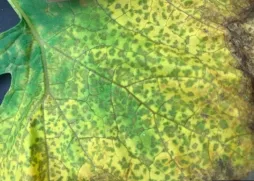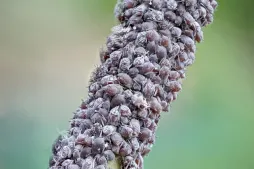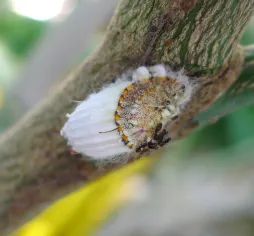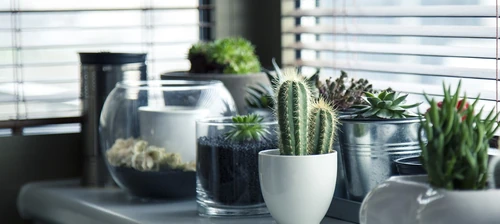Kalanchoe marmorata, Marbled Kalanchoe
Blossfeld's Kalanchoe is not the only flowering Kalanchoe. Kalanchoe marmorata adorns our homes with its white flowers in spring. And for the rest of the year, this plant from the Crassulaceae family looks great thanks to its purple foliage.
How to recognize Kalanchoe marmorata?
In pots, Kalanchoe marmorata grows to no more than 40 centimetres in all directions. But in its natural habitat, it can grow to over a metre in height! It's an upright succulent.
The fleshy stems are brown. They can be upright or rise perpendicular to the ground before dropping back.
The fleshy, obovate leaves have toothed margins. They can measure up to 20 centimetres in length. They are green at birth, turning blue-green and then yellow. As the leaf blade matures, purple mottling appears.
Kalanchoe marmorata flowers in spring. White, star-shaped flowers appear. They grow at the end of a stem up to 30 centimetres long.
This plant is toxic. Best kept away from young children and pets.
Our maintenance tips
Although kalanchoe marmorata can't stand the cold, they adapt very well to the dry air of our apartments, even in winter. Regular watering and a little care are all it takes to grow them indoors.
Watering
Touch the soil before watering. If it's two to three centimeters dry in summer and four centimeters dry in winter, it's time to give your Marbled Kalanchoe a drink.
Water the substrate withrainwater at room temperature. If you don't have any, you can use non-calcareous water. Moisten the rootball until the water runs off through the drainage holes.
Don't forget to empty any stagnant water in the dish. Kalanchoe marmorata hate to keep their roots in water. It makes them rot.
Repotting
In spring, transfer your Kalanchoe marmorata to a larger pot, so that it can continue to grow.
Get a pot with holes in it. Over time, foliage can become imposing. To prevent its weight from tipping the container over, choose a heavy model, in terracotta or ceramic for example. Line the bottom with pebbles.
This variety appreciates rich, well-drained soil. You can combine potting soil for flowering plants or heather soil with perlite or pozzolan. Pour in a layer of substrate, then plant your specimen in the center. Fill in with the rest of the mixture.
Water for the first time to eliminate air bubbles and encourage rooting.
Fertilization
You can stimulate the development of your plant during its growth phase, in spring and summer, with fertilizer.
Feed your Marbled Kalanchoe with a fertilizer for flowering plants.
Prune
Remove wilted flowers. If you can't cut the flower stem with your hands, you can use pruning shears. Remember to clean your tool beforehand to prevent disease transmission.
Cutting
Cutting is carried out during the strong growth phase, generally in spring and early summer.
Locate a healthy, flowerless stem. Using clean, sharp pruning shears, remove a section about ten centimeters long.
Remove the leaves at the bottom of the stem. Leave to dry for at least 24 hours, until a callus forms at the base.
In a pierced pot, pour a layer of gravel or clay balls, followed by the substrate. To promote growth, choose a rich potting soil such as horticultural compost or seedling and planting soil. You can add sand for drainage. Plant your graft and cover the roots with soil.
Place your cutting in a bright spot away from direct sunlight.
Place your cutting in a bright spot away from direct sunlight.
Diseases / Threats
Information
| Family | Crassulaceae - Crassulaceae |
| Type | Kalanchoë - Kalanchoe |
| Species | Marbled Kalanchoe - Kalanchoe marmorata |
| Lifecycle | Perennial |
| Foliage | Evergreen |
| Exposure | |
| Substrats | |
| Planting method |
In pots |
| Categories | |
| Tags |
Beginner Flowery Fritillary |
| Origin |
East Africa |
| Hardiness (USDA) | 10b |
| Leaf color |
|
| Flower color |
|
Discover plants from the same family
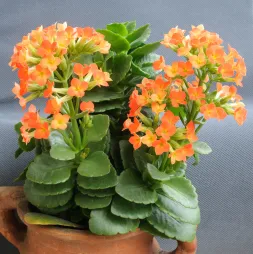
Blossfeld's Kalanchoe
Discover
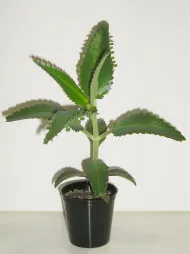
Kalanchoe of Daigremont
Discover

Thyrse flowered Kalanchoe
Discover
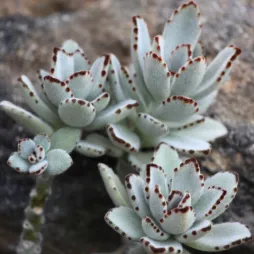
Panda plant
Discover











